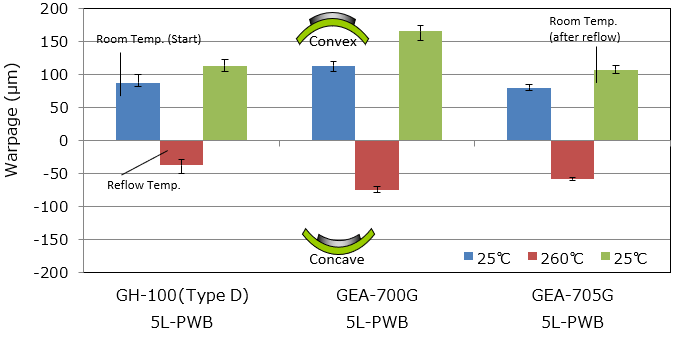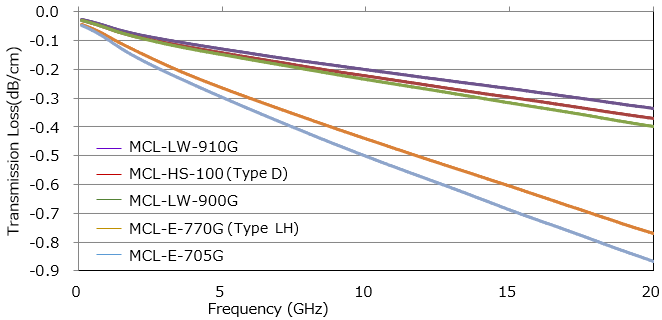Base Materials for PWBs
Halogen Free, High Tg, Low Transmission Loss, Low CTE Multilayer Material – MCL-HS100
Product Information and Application
Product form
- CCL: MCL-HS100
- Prepreg: GH-100
Applications
- Semiconductor packages. (FC-CSP, PoP, SiP)
- Thinner Module PWB
Features
- MCL-HS100 has hybrid properties of package and high speed materials.
- MCL-HS100 has low CTE value in X, Y directions and good dielectric property. (Dk 3.7, Df 0.0040 at 10GHz)
- MCL-HS100(Type D) achieved low dielectric constant (3.4 at 10GHz) and low dissipation factor (0.0025 at 10GHz) using low Dk glass.
- Well-suited for build-up construction.
Characteristics
Warpage of coreless-5 layer

TEG Chip
- Package size: 14mm×14mm
- Chip size: 7.3mm×7.3mm
- Chip thickness: 150 µm
- Underfill thickness: 60 µm (CEL-C-3730-4
TEG Substrate
- L1, 5: 12 µm Cu100%, L2, 3, 4: No copper, SR: –
Prepreg Construction
- GH-100 (Type D) (: 1078, R.C.: 63%)×4ply
- GEA-700G (: 1078, R.C.: 66%)×4ply
- GEA-705G (: 1078, R.C.: 65%)×4ply

Transmission Loss

Measurement conditions
- Evaluation PWB: Strip-line
- Temperture and Humidity: 25℃/60%RH
- Characteristic impedance: Approx. 50Ω
- Proofreading method: TRL(Thru-Reflect-Line)

- Trace width(w): 0.12–0.14mm
- Dielectric thickness(b): 0.25mm
- Trace thickness(t): 18 µm
Thin Laminate
(t0.2mm, t0.4mm)
| Item | Condition *3 | Unit | Actual Value | Reference (IPC-TM-650) |
|||
|---|---|---|---|---|---|---|---|
| MCL-HS100 | MCL-HS100 (Type D) | ||||||
| Tg | TMA method | A | ℃ | 240–260 | 2.4.24 | ||
| DMA method | A | 240–260 | ‐ | ||||
| CTE *1 | X (30–120℃) | A | ppm/℃ | 6–8 | ‐ | ||
| Y (30–120℃) | A | 6–8 | |||||
| Z | (<Tg) | A | 20–30 | 2.2.24 | |||
| (>Tg) | 130–180 | ||||||
| Solder Heat Resistance (260℃) | A | sec. | >300 | ‐ | |||
| T-260 (Without copper) | A | min. | >60 | 2.4.24.1 | |||
| T-288 (Without copper) | A | >60 | |||||
| Decomposition Temperature (TGA method 5% weight loss) | A | ℃ | 430–450 | 2.3.40 | |||
| Copper Peel Strength | 12 µm | A | kN/m | 0.7–0.9 | 2.2.8 | ||
| 18 µm | A | 0.8–1.0 | |||||
| Surface Roughness (Ra) | A | µm | 2–3 | 2.2.17 | |||
| Flexural Modulus (Lengthwise) | A | GPa | 23–28 | 2.4.4 | |||
| Dielectric Constant | 10GHz *2 | A | ‐ | 4.2–4.4 | 3.5–3.7 | IEC-62810 | |
| Dissipation Factor | 10GHz *2 | A | ‐ | 0.0050–0.0060 | 0.0025–0.0035 | ||
| Volume Resistivity | C-96/40/90 | Ω・cm | 1×1014–1×1016 | 2.5.17 | |||
| Surface Resistance | C-96/40/90 | Ω | 1×1013–1×1015 | ||||
| Insulation Resistance | A | Ω | 1×1014–1×1016 | ‐ | |||
| D-2/100 | 1×1013–1×1015 | ‐ | |||||
*1) Heating Rate: 10℃/min., *2) Measured by Cavity Resonator., *3) Refer to “Condition Note”
*Above data are experimental results and not guaranteed.
Standard Specifications
Copper Clad Laminate
| Part Number | Type | Copper Foil Thickness | Code Name | Laminate Thickness |
|---|---|---|---|---|
| MCL-HS100 | ‐ | 3 µm 12 µm (LP, HVLP) |
U0.04 | 0.04mm |
| 3 µm 12 µm 18 µm 35 µm (LP, RT, HVLP) |
M0.06 | 0.06mm | ||
| 0.1 | 0.10mm | |||
| 0.2 | 0.20mm | |||
| 0.41 | 0.40mm | |||
| (D) | 3 µm 12 µm (LP, HVLP) |
U0.04 | 0.04mm | |
| 3 µm 12 µm 18 µm 35 µm (LP, RT, HVLP) |
M0.06 | 0.06mm | ||
| 0.1 | 0.10mm | |||
| 0.2 | 0.20mm | |||
| 0.41 | 0.40mm |
Note 1) LP: Low profile copper foil, PF: Profile free copper foil.
Note 2) LP: 3 µm, 12 µm; RT: 18 µm, 35 µm; HVLP: 12 µm, 18 µm, 35 µm.
Note 3) The thickness means that of dielectric layer.
Prepreg
| Part Number | Type | Glass Cloth | Properties | |||
|---|---|---|---|---|---|---|
| Style | Resin Content (%) |
Dielectric Thickness after Lamination *1 (mm) |
||||
| GH-100 | (DF) | 0.025 | (See [GH-200 (Type DF)]page for ultra thin, flat prepregs) | |||
| ‐ | 0.03 | (1027N71) | 1027 | 71±2 | 0.042 | |
| 0.05 | (1037N71) | 1037 | 71±2 | 0.050 | ||
| 0.06 | (1078N61) | 1078 | 61±2 | 0.071 | ||
| 0.1 | (2116N55) | 2116 | 55±2 | 0.130 | ||
| (D) | 0.03 | (D1027N73) | 1027 | 73±2 | 0.042 | |
| 0.05 | (D1037N74) | 1037 | 74±2 | 0.051 | ||
| 0.06 | (D1078N63) | 1078 | 63±2 | 0.072 | ||
| 0.1 | (D2116N57) | 2116 | 57±2 | 0.130 | ||
| Reference (IPC-TM-650) | 2.3.16 | ‐ | ||||
*1) The dielectric thickness after lamination is defined as the thickness of one sheet of prepreg when the resin flow is 0%.
This value changes depending on the press condition or inner layer pattern.
